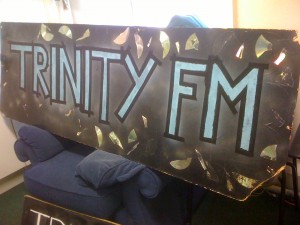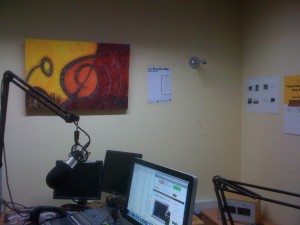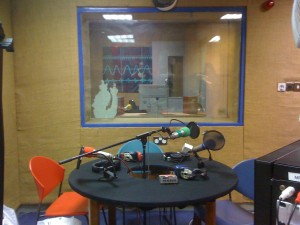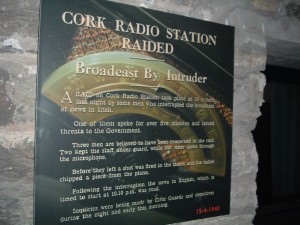On Radio Survivor today we are celebrating radio around the world in honor of World Radio Day. Matthew Lasar gave an update about free speech and dissent over the airwaves in his piece, “Radio Dissenters: The Global Struggle for Free Speech.” My contribution focuses on my first love: student radio. Recently I had the opportunity to visit two college radio stations in Ireland, Trinity FM at Trinity College Dublin and Belfield FM at University College Dublin. After delving a bit into their history I became even more intrigued about the history of college radio and about the regulations regarding student radio in Ireland.
Unlike college radio in the United States, which has a lengthy history dating back to the early days of radio, student radio in Ireland is a relatively new phenomenon. In fact, Irish radio was run entirely by the government up until 1988, meaning that there were no licensed college, community, or even commercial radio stations before that time (although there were pirate broadcasters).
Each of the college stations that I’ve visited in Ireland (Flirt FM, Belfield FM and Trinity FM) started up in the 1990s. What was surprising to me about several of these stations is that they are only licensed to operate for a certain number of weeks out of the year through a system of temporary licenses. In order to more fully understand this system I spoke with longtime community radio participant and participatory media advocate Andrew Ó Baoill, who was a founding station manager at Flirt FM and is now an Assistant Professor of Communication Studies at Cazenovia College.
According to Ó Baoill, “The temporary licenses precede the permanent college licenses. Through to 1988, the only licensed radio was provided by RTE, the state-run public service broadcaster. They ran a small number of short-term local stations, experimenting with a model of community radio in the late 1970s and early 1980s (which would have professional staff support local volunteer presenters and producers), but for various reasons that was squashed, and since then they’ve only run national services (with the exception of some services run out of Cork).”
Ó Baoill went on to explain that community radio was active during this time in the form of unlicensed broadcasters:
“Through this same period unlicensed/pirate radio was very vibrant – to the extent that Fianna Fail, the largest party, which ran of a platform that included getting rid of the pirates, actually ran their own pirate station as part of their campaign. There was a small but vibrant community radio sector, and an increasingly commercialized pirate sector. For obvious reasons, there were no ‘formal’ college stations during this period, though some stations did, undoubtedly, have links to various student bodies.”
He explained that when the government began licensing radio stations, there was a hierarchy that favored commercial stations. Ó Baoill added,
“From 1988, when independent stations were first licensed, the licensing authority privileged commercial operations over non-commercial. The legislation includes the stability and growth of the sector as a consideration to be looked at by the regulator in approving any new license, so there’s an in-built bias towards existing operators.”
I was most confused about the temporary licenses that many college radio stations have in Ireland. For example, Trinity FM is licensed by the Broadcast Authority of Ireland (BAI) to broadcast for 6 weeks this year and in the past others have been licensed for just a few weeks. Ó Baoill gave some background on this, saying,
“The 1988/1990 legislation did allow for 2-week licenses – for a total of 14 or 21 days a year – for temporary stations. The idea was that this would be ‘festival’ radio, and that local communities could get a station for their big annual festival. Not a huge amount of that happened, but many colleges (including UCG, now NUI Galway, where I got my start) did take advantage of it for Rag Week/College Week (Drinking/charity-fundraising festival in the Spring) and sometimes for the start of the academic year.”
And, indeed, that seems to have been the case at Trinity FM, where the initial broadcasts were temporary affairs that coincided with a big annual musical festival on campus. Ó Baoill outlined the beginnings of licensed student radio, saying,
“In 1995 the first full-time college stations were licensed, as the newly appointed board of the regulator, which was now headed up by the editor of the biggest music magazine in the country and had various community-sympathetic members, launched a program to license community radio stations, and college stations as a sub-sector of community radio.
The original idea in 1994/5 was that one college station would be licensed, as part of an 18 month pilot period. In actuality 4 were licensed (Flirt in Galway, Wired in Limerick, Cork Campus Radio, and DCU FM in Dublin). DCU FM was the best funded, and operated out of the largest Communications program in the country – but by the end of the pilot period the college had decided not to seek a long-term license.”
I’d wondered why more student stations in Ireland didn’t have permanent licenses and Ó Baoill added that,
“There have been efforts from Trinity and UCD over the years to push for a permanent license – but they have been hampered, I think, in large part by the fact that it’s been thought that there would only be space for one college licensee in Dublin, and they haven’t been able to sustain a joint plan to share the frequency long enough to get backing.”
He added that he doesn’t think that the various colleges in Dublin should have to necessarily band together to get a station, pointing out that “getting a first permanent frequency is likely to require sustained cooperation from the various college groups that might make use of that frequency.” He pointed out that another big challenge in Dublin is that,
“In addition, a college station in Dublin will face pushback from multiple stations, on not just technical but commercial grounds, in a way that stations elsewhere do not (because there are so many commercial stations in Dublin) – and I think the existing licensees like Flirt would see far more pushback were they looking for licenses now, in part because of the success of the existing stations.”
Today stations like Trinity FM operate for 6 weeks and that is in part due to some changes to the rules surrounding temporary licensing. Ó Baoill said,
“The temporary licenses were extended, during legislative changes a few years ago, to allow for several months a year per station (and they’re able to divide up the days quite a bit, as I understand it) – this seems to be an easy political fix for the issue, as temporary licenses don’t undergo quite the same level of scrutiny in the approvals process as do permanent stations, and it was a case of expanding an existing program. To change the law to make it easier to license permanent stations would require rewriting the core criteria to be considered by the Authority in managing the broadcast spectrum, and that would be opening up a whole can of worms.”
If you want to tune in to student radio in Ireland, here is a listing of the stations that I’m aware of:
Flirt FM at National University of Ireland in Galway (see my profile of the station)
Belfield FM at University College Dublin (see my profile of the station)
Trinity FM at Trinity College Dublin (see my profile of the station)
DIT FM at Dublin Institute of Technology
DCUfm at Dublin City University
Cork Campus Radio at University College Cork
Wired FM at Immaculate College and Limerick Institute of Technology, Limerick
A community radio organization in Ireland, The Community Radio Forum of Ireland (CRAOL), has helped to facilitate some campus radio gatherings known as Campus Connections. Through these events, stations have been able to get together and share tips about doing campus radio in Ireland.
While I’m talking about Irish radio, I have to mention a great resource for Irish radio history. If you are planning to visit Ireland, you should not miss the opportunity to visit Cork’s Radio Museum, which has some fascinating displays about the early history of radio in Ireland.






